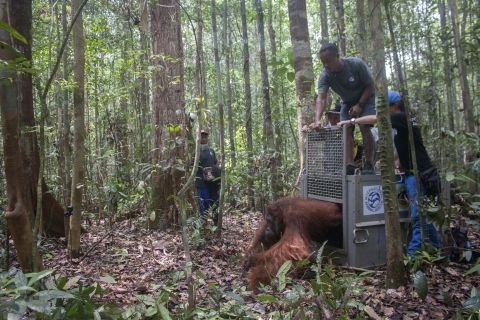
The male orangutan of more than 20 years old was finally judged ready for release after being rescued on 20 September from the village of Tanjungpura, Muara Pawan District in Ketapang. At the time of his rescue, Junai’s condition gave serious cause for concern. He was very thin and he was blind in his left eye. Our medical team examined him and found two bullets lodged in his skull directly behind his eyeball. It was a miracle that he was able to survive in such a condition.
After a month of treatment and recovery at our centre, Junai was deemed ready to go back to his natural habitat. The team decided not to remove the bullets behind his eye because the operation was extremely risky and could kill him.
Mount Tarak, not far from the Gunung Palung National Park, was chosen as the release site. Our release team, along with the Natural Resources Conservation Agency (BKSDA) in West Kalimantan, the Forestry Department of West Kalimantan and representatives of Gunung Palung National Park released Junai in the protected forest surrounding the mountain on Monday, 11 November.
The release operation took approximately 12 hours, using first a vehicle and then travelling on foot to the release site. This was the first orangutan release in the area of Mount Tarak since 2017. A total of 15 orangutans have been released in the region since 2014.
To ensure that Junai survives and continues to lead a healthy, happy life, we mobilised a team to track and observe him. Although he is suffering from partial blindness, the release team are convinced that his impaired vision is not going to reduce his ability to survive and to thrive. Orangutans are known to be extremely intelligent and adaptable.
“In 2016 we released an orangutan on Mount Tarak whose leg had been paralysed by pellets from an airgun. We monitored him every day for several months which confirmed that he was able to live a normal life even though one of his legs had been paralysed by the pellets, some of which had hit his nerves,” said Argitoe Ranting, Manager of Survey, Release and Monitoring. “The loss of one eye is not greatly going to affect Junai’s ability to survive because orangutans are quite good at adapting and coping in the wild. We believe he will be fine on his own and happy in his new home,” he added.
Karmele L Sanchez, Programme Director, said: “Junai is one of many victims of the forest and land fires. We are very sad to see the areas that have been burned in the forest that used to be Junai’s home. It is not uncommon for orangutans who lose their habitat to be seen in the vicinity of plantations or villages, where sometimes there are irresponsible people who just want to hurt orangutans by shooting bullets in their eyes. If the bullets had hit both eyes, this orangutan would be disabled forever and it would be impossible for him to continue his life in the wild. We are confident that the majority of people in Ketapang - and indeed in the whole of Borneo – would condemn the way this orangutan has been treated.”
Sadtata Noor, Head of the West Kalimantan BKSDA, said: “As a conservation organisation, we are working to build attitudes and behaviour where people care about the forests, ecosystems and wildlife. Sadly persecution against wildlife still takes place. We will continue rescuing animals but it is going to take a long time to change the mindset of some people to be kind to animals in the wild.”
The Head of the Department of Forestry Kalimantan Barat, Untad Dharmawan, said: “The release of wildlife back into its natural habitat aims to keep the balance of an ecosystem. And in this case the ecosystem is the forest. Each of the components within the ecosystem has its own essential role contributing to the overall balance and is mutually dependent on the others.

